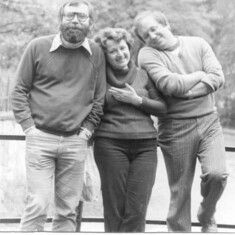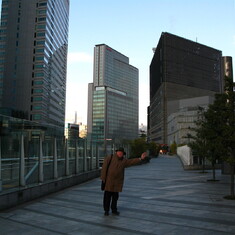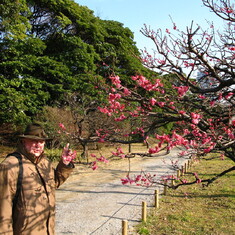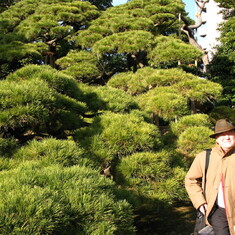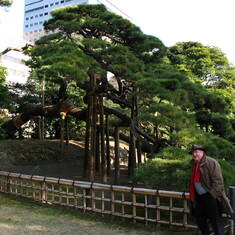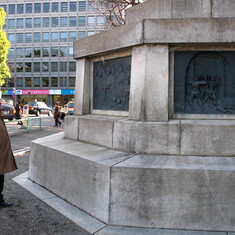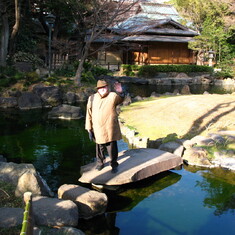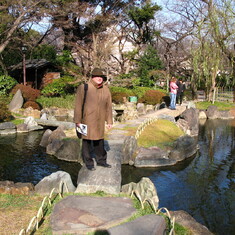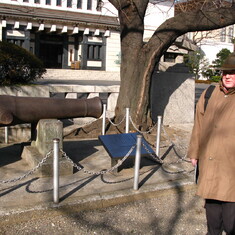March 18
March 18
Boris Mikhailovich Velychkovsky (1947–2022)
Borja
Boris Vellichkovsky was a prominent representative of the third generation of the Moscow School of Action-Based Psychology. In perceptual research, he extended his motor ideas of eye movement to a multifaceted functional modeling, modernized the concept of „functional organ” proposed by Luria. Boris enriched the existing Leontiev-, Luria-, Zinchenko-tradition by the application of modern imaging methods.
Boris, however, was not only an outstanding Russian scientist, but also a good friend who, combining the friendly embrace of a Russian bear with the irony of a superior intellect, was my friend for fifty years, wherever fate threw us in the midst of countries, positions and successes. A warm-hearted Russian, willing to do anything for friends, that is what he remained all his life.
I met Boris in 1969 as a young student from Moscow, who distinguished himself from the ELTE (Eötvös U)-MGU (Moscow U) exchange student team with his Western style reading background and language skills. The meeting itself was groundbreaking. Our classes were the first swallows to participate in the so-called currency-free summer exchange exercise between the students of Moscow State University – which I now know has been modernized at the time, in 1966 – and ELTE, Eötvös U of Budapest. This was one of the important initiatives of the Moscow Faculty of Psychology, which became an independent faculty in 1966. We spent a month each in the other's realm. We went first, in July 1969 under the guidance of Katalin Járó, a Leningrad graduate now an ELTE assistant lecturer. I got to know Borja as one of the most dynamic youngsters in the Russian exchange group, who was already striving to develop Russian motor perception concepts following Leontiev and Luria. The prominent neuropsychologist Luria published one of his last books on perception was written with him (Luria, Zinchenko and Velichkovsky, 1973). Already then, I learned a lot from my fellow student. It was thanks to him that I bought several new Russian books, of Luria, and Evgeny Sokolov In addition, I bought Russian editions of classics of cognitive research, like George Miller, or Donald Norman. I was also able to take part in many cultural experiences because of him, for example in '69 we saw Tarkovsky’s Andrei Rublev in Moscow at a limited screening. The film, which had endured much adversity, despite winning a Cannes prize in May '69, was not officially played in Soviet cinemas until 1971. Boris also guided me in museums in both Moscow and Leningrad, and besides the brilliant pictures of the classics and the impressionists, I met the magical images of Mikalojus Konstantinas Čiurlionis in Leningrad in a college dormitory in his company. Čiurlionis was a Lithuanian symbolist and Art Nouveau painter of the early XXth century. But I have yo confess that I thought he was a Soviet underground painter at the time, the student in the dormitory talked about him so mysteriously.
Boris was also a very direct and very interested young companion in Hungary. Impressed by Endre Grastyán’s lectures on the neuroscience of learning, Bris togethert with Anikó Kónya even travelled separately to Pécs to learn more about the works of the neuroscientistin his labprtatory in Pécs. Grastyán has just moved from the study of learning towards issues of the relationship between motivation and perception.
We stayed in touch throughout the years of Boris' emergence as a cognitive researcher in Moscow. Watching his books and articles, I saw how he built a comprehensive cognitive concept based on his multistage theory of perception. When I took the psychology students to Moscow in 1973, he was the leader of the partner group. During the two months we got to know a lot about each other's science, while we joked about the Soviet and Hungarian conditions at the time. Boris has always been an honest, at the same time self-critical and proud Russian scientist. Even then, at the zenith of the Brezhnev era, he dared to warn us against judging the quality of Russian science from the work of merely psychologists. When I started research on text memory, I found many hidden sources in Russian yearbooks and college publications from the thirties and fifties. Seeing how important this was to me, Boris obtained them on microfilm (there was no photocopier at that time).
In 1978 I spent two winter and spring months in Moscow as a courtesy towards my home Budapest department, that had to fill the empty slots of a Moscow-Budapest psychology contract. I didn't have much to research, but Boris helped me get to know the better side of Soviet psycholinguistics. It was thanks to him that I got to know the young A. A. Leontiev next to E. G. Simernickaia, a child neuropsychologist, and their work. Simernickaia, like me, used dichotic, competitive listening situations to explore the developmental significance of functional brain asymmetries. Boris introduced me to Tatiana Akhutina (formerly known as Riabova), whose works I knew as a researcher on the so-called dynamic aphasia related to prefrontal injuries, which resuls in difficulties to mobilize predicates. Tatiana and I both worked later on in projects of Liz Bates, and I got to know her as a very quiet, unduly modest and knowledgeable colleague.
At that time and during another trip to Moscow in the early 1980s, we talked a lot about my research in sentence psycholinguistics. Boris became a successful man by the eighties. He traveled extensively, becoming the export face of Moscow psychology. He visited Kuwait and South Korea as a teacher. He visited the GDR especially a lot. He also taught in Leipzig at the former department of Wundt and was preparing to write a German book on cognitive psychology. Seeing that he could handle the brain, perception and memory well, but had little knowledge of language, he offered me to write the language parts in English and translate them into German. I was anxious about the task and also discouraged by it, so Boris eventually wrote the section dealing with language, mainly based on German material (Velichkovsky, 1988).
On the 1983 trip, we also had a very typical Soviet case. Boris took us to the site of the National Exhibition on the outskirts of Moscow, not because of the exhibition, but because of his former teacher, the eminent perceptual researcher V. P. Zinchenko was exiled there from the university to the Institute of Technical Aesthetics. Boris left us to watch the exhibition while he arranged a vodka sandwich party for some of us at home, after a very exciting conversation with Zinchenko about art, technology and psychology. We agreed to meet somewhere in one of the downtown subway stations. However, I was very out of time, and according to Soviet secrecy, I did not know Boris's phone number. Next to the exhibition area was an elegant French hotel built at that time. (I think today is Hotel Maxima Slavia.) I was well aware that these international hotels were forbidden even to ordinary mortals, such as Hungarians, yet I smuggled my way through the cerberus and asked the porters for a Moscow telephone book in eloquent French. I looked up Boris's number and called him. Where are you? – Asked Boris. – In the lobby of Hotel Slavia. "Lord God, how did you get there?"
This is the world we had to live and thrive in. It is characteristic of Boris that, while he was such a cautious citizen, he greeted me on the first day that there had never been such a thing since Ivan the Terrible. Upon ascension to the throne, each tsar introduced a new vodka and raised its price. (The sale of vodka was a tsarist monopoly.) However, the new Tsar, former KGB chief Andropov lowered the vodka price from 5.20 to 4.70 rubles, which is why the new vodka had the nickname of Andropovskaia.
Boris maneuvered to the West during the years of regime change. After spending a lot of time in Berlin and Leipzig and gaining recognition in German cognitive circles, he worked as a Humboldt scholar at a research institute in Bielefeld and then in Toronto, Canada. Finally, for a decade and a half, he headed the Department of Engineering and Organizational Psychology at the newly reestablished, already all-German Technical University of Dresden. Active perception and eye movement research from the Moscow School took him further in several directions. He developed in detail the theory of levels of perception and cognition, based on active perception. Eye movements play a central role in this. At the same time, he began to investigate the communication role of eyes and gaze in collaborative laboratory situations. Starting from the duality of the two types of visual systems, action-directing, low-resolution but fast, and fine-resolution but slower, dorsal and ventral systems, controlling recognition, he linked the system of eye movements to the theory of the two visual systems. He interpreted the more crude eye movements as a function of the dorsal system. He incorporated applied eye movement research into this. He primarily investigated the two types of eye movements in laboratory situations where driving cars, but he also touched on developmental and pathological applications. At one time, he was also interested in the eye movements of children with Williams syndrome studied by us.
In Boris's new terrain we occasionally recontacted. I visited Dresden three times. I first added it in 1994 or 1995 as a sideline to another journey. László Komlósi the rector's secretary of Eötvös University the time, and I visited our modern linguist and psycholinguist colleague Josef Bayer, who was linguistics professor in Jena. We used a contract still active from the past, between the former GDR University of Jena and Eötvös U. We travelled in Laci's car and crossed a rather blizzard road from Jena to Dresden to Boris, whom Komlósi has also known form the past. Among ourselves, laci and me nicknamed Boris Ostap Bender because of his ubiquitous wandering style. He welcomed me warmly, showed me his new ergonomic laboratory and small restaurants hidden in castles around Dresden. Secondly, in 1998 he invited me to speak at the 41st Congress of the German Psychological Association. Reflecting the self-reflection of the whole regime change, I gave a lecture on Hungarian psychological symbolism in the sixties, on the struggle between controlled and seeking and initiating human imagery, which was published in the volume of the conference (Pléh, 1999), and has provided my important self-reference framework ever since. Boris was a very cordial host and a very influential colleague in the German milieu. With my wife Ottilia we travelled together and first spent a few days in Berlin. When we arrived in Dresden by train, a young man was waiting at the station as the driver of a brand new factory BMW. All this is a good indication of Boris's German embeddedness and influence. When we asked him, he said that since his ergonomic lab also works for car manufacturers, they sponsored the congress by providing walk-in cars for VIP guests, Boris only had to organize drivers. The students enthusiastically undertook this. We had a very exciting week in Dresden. It was there that we met for the first time in Europe with Michael Tomasello from America. We also wandered around a lot in Dresden. Our most surprising experience of the city was the ruin garden of the Frauenkirche, which disappeared during the carpet bombing of the war. In addition to the ruins, plans and drawings were exhibited, and the drawings numbered the stones found. We smiled a little at German engineering optimism. Around 2006, Boris invited me again. The church stood there in all its splendour, with the ruins found in their place.
Boris invited me to a memorial lecture named after Karl Bühler, who had been a professor in Dresden for a short time, at the beginning of the 1920s. As an admirer of Bühler, I presented the talk with great enthusiasm.
Then Boris somehow disappeared from the world of real presence. We corresponded, but always at his email address in Dresden, and I thought he was still there. Then in 2006 I went to Petersburg with my students for an international congress on cognitive science, and who else would have been the main organizer but Boris. As a German pensioner, he returned to Moscow. The congress was very cosmopolitan, with many important speakers. Boris published a two-volume Russian book for the occasion, a synthesis of cognitive experimental psychology and engineering minded cognitive science (Velichkovskij, 2006). We could talk little because Boris was very busy with his many guests.
We made up for it in 2016 when we went on a long family trip from Moscow to Baikal. We started from him. Boris and his wife Anna waited with a wonderful hospitality , cavbiar and vodka in the freezer, and kept us well for four days. It turned out to me that, in addition to university psychology, Boris works as a Russian academician at the Kurchatov Institute, the center of Russian nuclear technology. He did not become a nuclear scientist, but organized and operated a very modern neuro imaging system there. They also engaged in linguistic research, mainly on neurological correlations of the dictionary system. After many conversations, I became one of Boris' referrals to the Academia Europaea, where he became a member. After our visit, we planned for years with him and his son to perform Hungarian dictionary imaging studies in the mysterious Moscow laboratory, comparing Hungarian dictionary mapping with Russian. This never materialized.
Boris was a wonderful, caring host. When he escorted me to the station, we saw the Russian gentleman in him. As we stumbled around with many of our luggage, he called out to the porters who were slackening twenty yards away: Now, kiddies, don't you want to help poor passengers? They ran to pick up our luggage. This was my last personal picture of Boris. We corresponded a lot, dreaming of joint experiments. Also their son , also a cognitive psychologist, Boris Borisovich Velichkovsky even squeezed an English-language Moscow article out of me and Bálint Forgács. The warm-hearted, always kind Boris became a cloud in January 2022, the cloud in which we wanted to place the words together.
References
Luria, Alekszandr R., Zinchenko, Vladimir P. and Velichkovsky, Boris I. (1973). Psichologia vospriatija. Moszkva, MGU.
Pléh Csaba (1999). The symbolics of psychology under a totalitarian system: The case of Hungary in the 1960s. In Hacker, W. and Remeck, M. (eds.): Zukunft gestalten: Bericht über den 41. Kongress der Deutschen Gesellschaft für Psychologie in Dresden 1998. Lengench, Pabst Science Publishers, 109–122.
Velichkovsky, B.M. (1988). Wissen und Handeln. Berlin/Weinheim: Deutscher Verlag der Wissenschaften.
Velichkovsky, B. M. (2006). Kognitivnaja nauka: Osnovy psihologii poznanija. Moscow: Academia.
Borja
Boris Vellichkovsky was a prominent representative of the third generation of the Moscow School of Action-Based Psychology. In perceptual research, he extended his motor ideas of eye movement to a multifaceted functional modeling, modernized the concept of „functional organ” proposed by Luria. Boris enriched the existing Leontiev-, Luria-, Zinchenko-tradition by the application of modern imaging methods.
Boris, however, was not only an outstanding Russian scientist, but also a good friend who, combining the friendly embrace of a Russian bear with the irony of a superior intellect, was my friend for fifty years, wherever fate threw us in the midst of countries, positions and successes. A warm-hearted Russian, willing to do anything for friends, that is what he remained all his life.
I met Boris in 1969 as a young student from Moscow, who distinguished himself from the ELTE (Eötvös U)-MGU (Moscow U) exchange student team with his Western style reading background and language skills. The meeting itself was groundbreaking. Our classes were the first swallows to participate in the so-called currency-free summer exchange exercise between the students of Moscow State University – which I now know has been modernized at the time, in 1966 – and ELTE, Eötvös U of Budapest. This was one of the important initiatives of the Moscow Faculty of Psychology, which became an independent faculty in 1966. We spent a month each in the other's realm. We went first, in July 1969 under the guidance of Katalin Járó, a Leningrad graduate now an ELTE assistant lecturer. I got to know Borja as one of the most dynamic youngsters in the Russian exchange group, who was already striving to develop Russian motor perception concepts following Leontiev and Luria. The prominent neuropsychologist Luria published one of his last books on perception was written with him (Luria, Zinchenko and Velichkovsky, 1973). Already then, I learned a lot from my fellow student. It was thanks to him that I bought several new Russian books, of Luria, and Evgeny Sokolov In addition, I bought Russian editions of classics of cognitive research, like George Miller, or Donald Norman. I was also able to take part in many cultural experiences because of him, for example in '69 we saw Tarkovsky’s Andrei Rublev in Moscow at a limited screening. The film, which had endured much adversity, despite winning a Cannes prize in May '69, was not officially played in Soviet cinemas until 1971. Boris also guided me in museums in both Moscow and Leningrad, and besides the brilliant pictures of the classics and the impressionists, I met the magical images of Mikalojus Konstantinas Čiurlionis in Leningrad in a college dormitory in his company. Čiurlionis was a Lithuanian symbolist and Art Nouveau painter of the early XXth century. But I have yo confess that I thought he was a Soviet underground painter at the time, the student in the dormitory talked about him so mysteriously.
Boris was also a very direct and very interested young companion in Hungary. Impressed by Endre Grastyán’s lectures on the neuroscience of learning, Bris togethert with Anikó Kónya even travelled separately to Pécs to learn more about the works of the neuroscientistin his labprtatory in Pécs. Grastyán has just moved from the study of learning towards issues of the relationship between motivation and perception.
We stayed in touch throughout the years of Boris' emergence as a cognitive researcher in Moscow. Watching his books and articles, I saw how he built a comprehensive cognitive concept based on his multistage theory of perception. When I took the psychology students to Moscow in 1973, he was the leader of the partner group. During the two months we got to know a lot about each other's science, while we joked about the Soviet and Hungarian conditions at the time. Boris has always been an honest, at the same time self-critical and proud Russian scientist. Even then, at the zenith of the Brezhnev era, he dared to warn us against judging the quality of Russian science from the work of merely psychologists. When I started research on text memory, I found many hidden sources in Russian yearbooks and college publications from the thirties and fifties. Seeing how important this was to me, Boris obtained them on microfilm (there was no photocopier at that time).
In 1978 I spent two winter and spring months in Moscow as a courtesy towards my home Budapest department, that had to fill the empty slots of a Moscow-Budapest psychology contract. I didn't have much to research, but Boris helped me get to know the better side of Soviet psycholinguistics. It was thanks to him that I got to know the young A. A. Leontiev next to E. G. Simernickaia, a child neuropsychologist, and their work. Simernickaia, like me, used dichotic, competitive listening situations to explore the developmental significance of functional brain asymmetries. Boris introduced me to Tatiana Akhutina (formerly known as Riabova), whose works I knew as a researcher on the so-called dynamic aphasia related to prefrontal injuries, which resuls in difficulties to mobilize predicates. Tatiana and I both worked later on in projects of Liz Bates, and I got to know her as a very quiet, unduly modest and knowledgeable colleague.
At that time and during another trip to Moscow in the early 1980s, we talked a lot about my research in sentence psycholinguistics. Boris became a successful man by the eighties. He traveled extensively, becoming the export face of Moscow psychology. He visited Kuwait and South Korea as a teacher. He visited the GDR especially a lot. He also taught in Leipzig at the former department of Wundt and was preparing to write a German book on cognitive psychology. Seeing that he could handle the brain, perception and memory well, but had little knowledge of language, he offered me to write the language parts in English and translate them into German. I was anxious about the task and also discouraged by it, so Boris eventually wrote the section dealing with language, mainly based on German material (Velichkovsky, 1988).
On the 1983 trip, we also had a very typical Soviet case. Boris took us to the site of the National Exhibition on the outskirts of Moscow, not because of the exhibition, but because of his former teacher, the eminent perceptual researcher V. P. Zinchenko was exiled there from the university to the Institute of Technical Aesthetics. Boris left us to watch the exhibition while he arranged a vodka sandwich party for some of us at home, after a very exciting conversation with Zinchenko about art, technology and psychology. We agreed to meet somewhere in one of the downtown subway stations. However, I was very out of time, and according to Soviet secrecy, I did not know Boris's phone number. Next to the exhibition area was an elegant French hotel built at that time. (I think today is Hotel Maxima Slavia.) I was well aware that these international hotels were forbidden even to ordinary mortals, such as Hungarians, yet I smuggled my way through the cerberus and asked the porters for a Moscow telephone book in eloquent French. I looked up Boris's number and called him. Where are you? – Asked Boris. – In the lobby of Hotel Slavia. "Lord God, how did you get there?"
This is the world we had to live and thrive in. It is characteristic of Boris that, while he was such a cautious citizen, he greeted me on the first day that there had never been such a thing since Ivan the Terrible. Upon ascension to the throne, each tsar introduced a new vodka and raised its price. (The sale of vodka was a tsarist monopoly.) However, the new Tsar, former KGB chief Andropov lowered the vodka price from 5.20 to 4.70 rubles, which is why the new vodka had the nickname of Andropovskaia.
Boris maneuvered to the West during the years of regime change. After spending a lot of time in Berlin and Leipzig and gaining recognition in German cognitive circles, he worked as a Humboldt scholar at a research institute in Bielefeld and then in Toronto, Canada. Finally, for a decade and a half, he headed the Department of Engineering and Organizational Psychology at the newly reestablished, already all-German Technical University of Dresden. Active perception and eye movement research from the Moscow School took him further in several directions. He developed in detail the theory of levels of perception and cognition, based on active perception. Eye movements play a central role in this. At the same time, he began to investigate the communication role of eyes and gaze in collaborative laboratory situations. Starting from the duality of the two types of visual systems, action-directing, low-resolution but fast, and fine-resolution but slower, dorsal and ventral systems, controlling recognition, he linked the system of eye movements to the theory of the two visual systems. He interpreted the more crude eye movements as a function of the dorsal system. He incorporated applied eye movement research into this. He primarily investigated the two types of eye movements in laboratory situations where driving cars, but he also touched on developmental and pathological applications. At one time, he was also interested in the eye movements of children with Williams syndrome studied by us.
In Boris's new terrain we occasionally recontacted. I visited Dresden three times. I first added it in 1994 or 1995 as a sideline to another journey. László Komlósi the rector's secretary of Eötvös University the time, and I visited our modern linguist and psycholinguist colleague Josef Bayer, who was linguistics professor in Jena. We used a contract still active from the past, between the former GDR University of Jena and Eötvös U. We travelled in Laci's car and crossed a rather blizzard road from Jena to Dresden to Boris, whom Komlósi has also known form the past. Among ourselves, laci and me nicknamed Boris Ostap Bender because of his ubiquitous wandering style. He welcomed me warmly, showed me his new ergonomic laboratory and small restaurants hidden in castles around Dresden. Secondly, in 1998 he invited me to speak at the 41st Congress of the German Psychological Association. Reflecting the self-reflection of the whole regime change, I gave a lecture on Hungarian psychological symbolism in the sixties, on the struggle between controlled and seeking and initiating human imagery, which was published in the volume of the conference (Pléh, 1999), and has provided my important self-reference framework ever since. Boris was a very cordial host and a very influential colleague in the German milieu. With my wife Ottilia we travelled together and first spent a few days in Berlin. When we arrived in Dresden by train, a young man was waiting at the station as the driver of a brand new factory BMW. All this is a good indication of Boris's German embeddedness and influence. When we asked him, he said that since his ergonomic lab also works for car manufacturers, they sponsored the congress by providing walk-in cars for VIP guests, Boris only had to organize drivers. The students enthusiastically undertook this. We had a very exciting week in Dresden. It was there that we met for the first time in Europe with Michael Tomasello from America. We also wandered around a lot in Dresden. Our most surprising experience of the city was the ruin garden of the Frauenkirche, which disappeared during the carpet bombing of the war. In addition to the ruins, plans and drawings were exhibited, and the drawings numbered the stones found. We smiled a little at German engineering optimism. Around 2006, Boris invited me again. The church stood there in all its splendour, with the ruins found in their place.
Boris invited me to a memorial lecture named after Karl Bühler, who had been a professor in Dresden for a short time, at the beginning of the 1920s. As an admirer of Bühler, I presented the talk with great enthusiasm.
Then Boris somehow disappeared from the world of real presence. We corresponded, but always at his email address in Dresden, and I thought he was still there. Then in 2006 I went to Petersburg with my students for an international congress on cognitive science, and who else would have been the main organizer but Boris. As a German pensioner, he returned to Moscow. The congress was very cosmopolitan, with many important speakers. Boris published a two-volume Russian book for the occasion, a synthesis of cognitive experimental psychology and engineering minded cognitive science (Velichkovskij, 2006). We could talk little because Boris was very busy with his many guests.
We made up for it in 2016 when we went on a long family trip from Moscow to Baikal. We started from him. Boris and his wife Anna waited with a wonderful hospitality , cavbiar and vodka in the freezer, and kept us well for four days. It turned out to me that, in addition to university psychology, Boris works as a Russian academician at the Kurchatov Institute, the center of Russian nuclear technology. He did not become a nuclear scientist, but organized and operated a very modern neuro imaging system there. They also engaged in linguistic research, mainly on neurological correlations of the dictionary system. After many conversations, I became one of Boris' referrals to the Academia Europaea, where he became a member. After our visit, we planned for years with him and his son to perform Hungarian dictionary imaging studies in the mysterious Moscow laboratory, comparing Hungarian dictionary mapping with Russian. This never materialized.
Boris was a wonderful, caring host. When he escorted me to the station, we saw the Russian gentleman in him. As we stumbled around with many of our luggage, he called out to the porters who were slackening twenty yards away: Now, kiddies, don't you want to help poor passengers? They ran to pick up our luggage. This was my last personal picture of Boris. We corresponded a lot, dreaming of joint experiments. Also their son , also a cognitive psychologist, Boris Borisovich Velichkovsky even squeezed an English-language Moscow article out of me and Bálint Forgács. The warm-hearted, always kind Boris became a cloud in January 2022, the cloud in which we wanted to place the words together.
References
Luria, Alekszandr R., Zinchenko, Vladimir P. and Velichkovsky, Boris I. (1973). Psichologia vospriatija. Moszkva, MGU.
Pléh Csaba (1999). The symbolics of psychology under a totalitarian system: The case of Hungary in the 1960s. In Hacker, W. and Remeck, M. (eds.): Zukunft gestalten: Bericht über den 41. Kongress der Deutschen Gesellschaft für Psychologie in Dresden 1998. Lengench, Pabst Science Publishers, 109–122.
Velichkovsky, B.M. (1988). Wissen und Handeln. Berlin/Weinheim: Deutscher Verlag der Wissenschaften.
Velichkovsky, B. M. (2006). Kognitivnaja nauka: Osnovy psihologii poznanija. Moscow: Academia.


